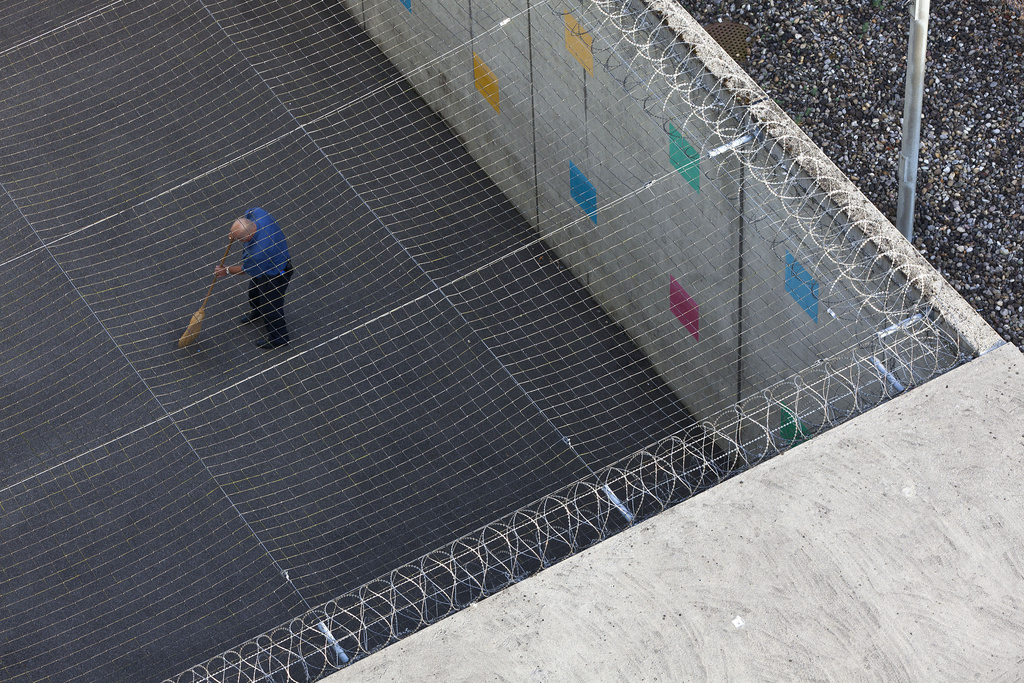Hand-wringing over unorthodox use of political initiative

Swiss citizens will again be called to the ballot box to vote on an initiative to automatically expel foreign nationals convicted of particular crimes. A historical first, this most recent initiative was launched by the conservative right Swiss People’s Party to force implementation of a previous deportation initiative.
Narrowly passed by the electorate in 2010, the original initiative text called for the automatic expulsion of foreign criminals for certain crimes, including murder, rape, robbery and human trafficking, but also less serious offences.
Long procedural delays having to do with proportionality, the definition of crimes specified by the initiative, and its compatibility with international agreements and treaties have vexed its implementation by parliament.
Miffed at the pace, the People’s Party launched a second initiative in 2012 to force implementation – adding a new and controversial instrument to the arsenal of direct democracy in Switzerland.
Throwing down the gauntlet
Is the throwing down of the gauntlet represented by this second initiative a “form of pressure”, an “improper use of the political rights of the people” or simply “unnecessary”, as termed by the cabinet, the collective head of the Swiss government?
The unusual People’s Party tactic has been facing wide-ranging criticism.
This second initiative, “for the implementation of the initiative for the expulsion of criminal foreigners”, demands that the original be applied verbatim.

More
Swiss wrestle with expelling undesirables
Because parliament had inserted a clause to the original permitting the waiver of automatic expulsion in cases of severe personal hardship, it was argued that the initiative was not being put into force in accordance with the wishes of its initiators.
Traditionally, parliament has had considerable leeway in adapting the text of constitutional amendments into law.
People’s Party President Toni Brunner said that as the federal authorities had dawdled with regards to implementing the 2010 text, and changes such as the aforementioned clause had been anticipated, the party leadership had asked itself in summer 2012: “What will we do if we find that the resulting constitutional change is not being implemented or is being insufficiently implemented?”
One of the ideas mooted was a new, second initiative to force implementation of the 2010 initiative to expel undesirables. This new initiative mandates that the original be implemented directly from the Swiss constitution. Among other things, this would mean listing the catalogue of offences leading to automatic expulsion directly in the Swiss constitution.
Constitutional conundrum
“It is a new instrument insofar as it is an attempt to overturn, or force, a decision of parliament,“ says Marc Bühlmann, a political scientist at the University of Bern.
“Previously, referendums tended to serve this purpose. This is, if you will, a ‘referendum-initiative’.”
Referendums and people’s initiatives are two different instruments in Swiss law. Laws passed by parliament can be challenged if opponents gather at least 50,000 signatures within 100 days of the law being published. This is known as a referendum.
When interest groups propose new legislation and managed to gather at least 100,000 signatures in support, this goes to a nationwide vote known as a people’s initiative.

More
What’s a people’s or citizens’ initiative?
So why did the People’s Party not launch a referendum, which requires only half the number of signatures?
“We had reason to fear that we might eventually have to resort to a referendum against a law that was perhaps a little better than the old one, but not the equal of the constitutional article that the people voted in,” says the People’s Party president.
The implementation initiative has only a single goal: “To help the will of the people achieve a breakthrough.”
“The enforcement initiative was a relatively clever move from the point of view of party strategy,“ says Bühlmann. “It almost led to the expulsion initiative being implemented in the way that the People’s Party would have liked.”
Markus Schefer, professor of constitutional and administrative law at the University of Basel, is more critical of this type of people’s initiative. “They are being used with the intention of provoking breaches of international law and other serious infringements. This combination seems new to me. And that is very regrettable,” he says.
“[With the implementation initiative] the principle of proportionality, which pervades our whole legal system and which is of key importance, has in part been damaged in a very significant way,” Schefer adds.
Separation of powers undermined?
Wolf Linder, emeritus professor of political science at the University of Bern, goes even further, seeing the principle of separation of powers endangered. “The problem is that the separation of powers is broken if direct instructions on how to enforce a people’s initiative are given to parliament, the government, and the courts,” he says.
“Those who make laws should not also be in a position of enforcing the very same laws they have written. Enforcement should be subject to independent oversight. This principle is fundamental,” he argues.
When modern Switzerland was founded in 1848, its founder established three levels of power in the federal constitution: legislative (Parliament), executive (cabinet, state government), and judicial (the Federal Court, and, today, several courts).
These three forces are legally separated (separation of powers, checks and balances) to avoid any one branch accumulating too much power in the hands of a single state authority.
Linder said that international comparisons show that “no separation of powers, no constitution, and where the constitution loses its way there exists a danger of slipping into an authoritarian regime”.
However, it is worth bearing in mind that the separation of powers is also strained in other ways, for example, when the Federal Court interferes in the affairs of cantonal and municipalities with regards to election rules.
Pressure
Kurt Fluri, a lawyer and member of the House of Representatives for the centre-right Radical Party, sits on the committee of political institutions. He sees parliament pressurised and the separation of powers undermined by the implementation initiative. “By voting for this initiative to be enforced directly through the constitution, the people have granted themselves the right to make statutory law,” says Fluri.

More
How Switzerland’s political system of direct democracy works
“When the people put themselves forth as legislators, this is assuredly no longer in the original sense of the constitution,” he continues.
“Separation of powers, now please…parliament also cannot hold all rights for itself,” retorts People’s Party President Brunner. “And the courts: in Switzerland we increasingly ascertain a tendency for courts to suddenly not care a jot for the people’s decisions by way of reference to international rights or international contracts.”
The People’s Party launched another people’s initiative earlier this year stipulating that Swiss law would have primacy over international law.
Hamstrung?
The aim of the People’s Party with the implementation initiative is to ensure that their original initiative on the expulsion of undesirables is implemented to the letter. But it is not in the spirit of the Swiss constitution “to itself regulate this type of detailed provisions,” argues Fluri.
Rather, it is the responsibility of parliament as the legislative branch to formulate how an initiative passed by the voters is codified into law. Fluri sees parliament’s room to manoeuvre as severely restricted in this instance.
“Parliament has not done its job,” counters Brunner.
Relatively recent
It is only in recent years that the task of implementing initiatives has come to occupy parliament with ever-greater frequency. Only 22 people’s initiatives have passed since the instrument was introduced more than 120 years ago.
But the pace has accelerated: between 1893 to1949 only seven initiatives were accepted, whereas since 1982 15 have been accepted, virtually on an annual basis since 2008. In 2014, for the first time ever, two people’s initiatives were voted in.
“Constitutional law should confine itself to basic standards of organisation and government functions. Then parliament has ample latitude in the design of the legislation,” says political scientist Linder.
For his part, Fluri emphasises that in this particular case, the implementation initiative would be directly realised through the constitution, leaving parliament no scope.
“The preamble to the implementation initiative states expressly that it is directly applicable and does not require any further legal legislation in order to be implemented.”
No decision sacrosanct
For political scientist Bühlmann no decision is ever sacrosanct. “I had similar concerns at the beginning. I thought, this is riding roughshod over the idea of direct democracy,” he says.
But viewed objectively the implementation initiative “is nothing more than an impetus from the bottom, which, should it be voted in, will be debated in parliament again, with a certain amount of room to manoeuvre”.
“It’s actually sad that we have to use this mechanism,” says politician Brunner. He says he hopes his People’s Party would not have to resort to implementation initiatives again. “But I cannot rule it out.”
The implementation initiative is expected to be brought before voters next year at the earliest.
Adapted from German by Kathleen Peters

In compliance with the JTI standards
More: SWI swissinfo.ch certified by the Journalism Trust Initiative

















You can find an overview of ongoing debates with our journalists here . Please join us!
If you want to start a conversation about a topic raised in this article or want to report factual errors, email us at english@swissinfo.ch.